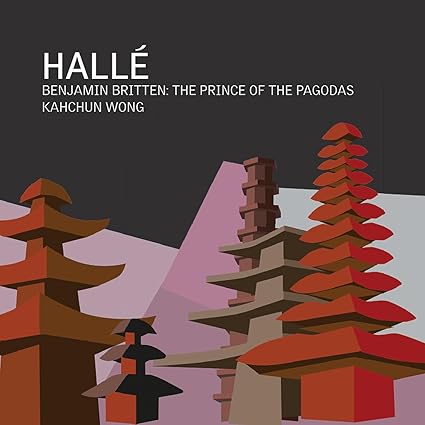

Benjamin Britten (1913-1976): The Prince of the Pagodas (Complete Ballet)
I count myself as a Britten aficionado, one of those 3-5 composers I reach for whenever I am listening for pure pleasure. However, despite that I think this is the first time I have heard this complete ballet, for decades at the very least. The composer himself was somewhat ambivalent about this work, and it is more often heard as a suite, the intention being to concentrate on the parts most attractive outside the performing ballet context.
Therefore, this release, while not the first of the complete ballet, is the first for some time, and given the prominence of the Balinese Gamelan instruments, it is perhaps especially fitting for the performance to be conducted by the new Singaporean Hallé Principal Conductor who in his booklet note discusses how he first encountered Britten's score as part of his compositional studies, partly because of the inclusion of these instruments.
The recording, playing and conducting are of a high order, and no cause for hesitation. There are some ballets where I really prefer listening to excerpts, I personally sometimes count the Tchaikovsky ballets like Swan Lake and Sleeping Beauty in this group, and others where I prefer the whole ballet to the suite (Stravinsky's Firebird is one for me). Sometimes, the complete ballets contain sections that seem to need the visual accompaniment of the dancers and choreography, sometimes the sheer orchestral brilliance is enough (for me at least).
Britten's ballet has elements of both. Firstly, like Tchaikovsky's Nutcracker for example, it has a literal flow of wonderful short dance pieces, melodically alive, with some incredible instrumentation. I was constantly noting examples as I was listening, beautiful woodwind solos, strummed harp and strings, it's really like a series of musical lollipops. The humorous bassoon solo at the start of the March in Act 1 for example then expands into a full orchestra section that for the life of me reminded me of Copland. And that's just 1 of 48 tracks, and I have yet to find one that does not offer something of interest, and all reflect what a highly gifted composer Britten was. So, given no pressure of time, I would be quite happy listening to each track, or even a random selection of them for a shorter listen. For anyone open to Britten, I highly recommend this as a good listen, it really is like listening to a Tchaikovsky ballet.
My only hesitation, and maybe this was part of Britten's own ambivalence, it does not quite have the emotional heft of say Sinfonia da Requiem, or the song cycles, or the War Requiem. Maybe this is to be expected, given Britten's checkered history with dance, the booklet does a nice job of summarizing this. It was originally commissioned by the Sadler's Wells ballet, and the choreographer (John Cranko) basically left Britten mainly on his own with a list of dances with durations that he needed for the ballet. Without the guidance of words (Britten was one of the best at setting words in my opinion), relying more on balletic gestures, he struggled with its composition.
Luckily for the composer, his visit to Bali in 1955-56 and the experience of the Gamelan instruments gave him a creative boost and enabled him to complete the score for its first performance in 1957. It provided him with an entry point into a different musical language, rich in new melodic, rhythmic, and textural traditions, and a language he retained a respect for throughout the rest of his life.
In the end, like many ballets, it's a series of often short episodic pieces, brilliantly orchestrated, and deserves much more attention than it typically gets. It is given an excellent interpretation, performance and recording here that brings out the full humor and demonstrates the scintillating musical ear of this composer. It is worth hearing just for sheer enjoyment, even if it would not be the first musical choice in this composer's oeuvre I would have in time of emotional need and succor.
Ian Orbell - November 2024 Act 1 - March and Courtiers' Dance